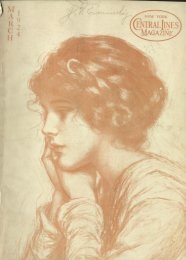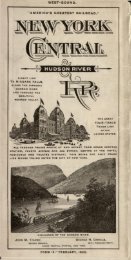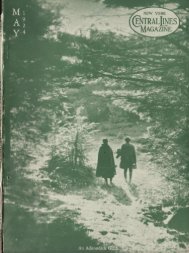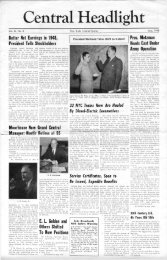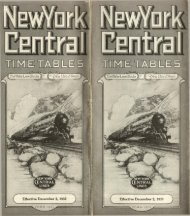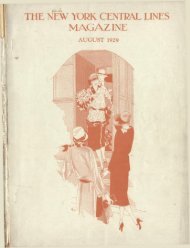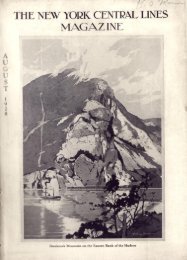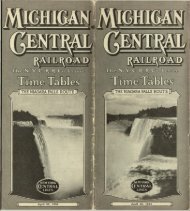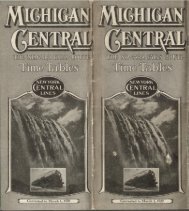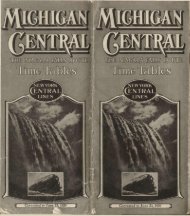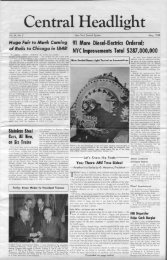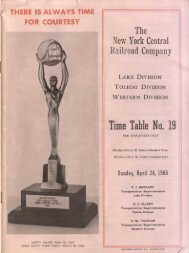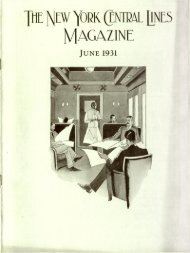You also want an ePaper? Increase the reach of your titles
YUMPU automatically turns print PDFs into web optimized ePapers that Google loves.
14<br />
adopted the name of the "Republican<br />
Party." Thus he may be said to have<br />
been a charter member of the party<br />
•with which he was affiliated for the<br />
remainder of his life. As soon as he<br />
had received his degree he threw himself<br />
enthusiastically into the Presidential<br />
campaign of 1856, supporting<br />
Fremont and Dayton, making speeches<br />
in their behalf and beginning a political<br />
career which made him so prominent<br />
a figure in every succeeding<br />
presidential campaign.<br />
As Politician in New York<br />
Mr. Depew was a member of the<br />
New York Assembly in 1861-2. He<br />
was not a candidate, but was nominated<br />
during his absence from the<br />
State. Of course, he could expect<br />
nothing from his father, and his own<br />
earnings were not large, so he had to<br />
rely upon a personal canvass of a district<br />
which had been largely covered<br />
by rich candidates running against<br />
each other and spending large<br />
amounts of money. But Mr. Depew<br />
made a hot canvass, speaking every<br />
day, and with an investment of less<br />
than $100 for traveling and other expenses,<br />
he was triumphantly elected.<br />
Few men have done so much for<br />
others in politics and sought or received<br />
less for himself than Chauncey<br />
M. Depew. This service in the legislature<br />
was followed by a term as<br />
Secretary of State of New York.<br />
The first National Convention Mr.<br />
Depew ever attended was held in Baltimore<br />
in 1864, when Lincoln was renominated.<br />
Thereafter he was a regular<br />
attendant at National Conventions.<br />
He was delegate-at-large, representing<br />
the whole State, to the Republican<br />
National Convention in 1888,<br />
1892, 1896, 1900, 1904, and was a delegate<br />
in 1908, 1912 and 1916. At the<br />
convention in 1888 he placed Benjamin<br />
Harrison in nomination for the<br />
presidency and he nominated Governor<br />
Morton in 1896.<br />
At the Republican Convention of<br />
1888 Mr. Depew received 99 votes for<br />
the presidential nomination.<br />
His Senatorial Career<br />
He declined election as United<br />
States Senator in 1885 and also declined<br />
appointment as Secretary of<br />
State in the Cabinet of Benjamin<br />
Harrison. But later on he thought<br />
better of the attractions of a term in<br />
the Senate and became Senator from<br />
New York for the two terms from<br />
1899 to 1911.<br />
In 1866 Commodore Vanderbilt sent<br />
for him and offered him the position<br />
of Attorney for the New York & Harlem<br />
Railroad. Mr. Depew had just<br />
been nominated and confirmed United<br />
States Minister to Japan. The appointment<br />
was a complete surprise to<br />
him as he had not been an applicant<br />
for any federal position. The salary<br />
as a Minister was $7,500 a year and<br />
an outfit of $9,000. Commodore Vanderbilt's<br />
offer of the attorneyship for<br />
the Harlem Railroad, which was his<br />
first venture in railroading, was far<br />
less than the salary as Minister.<br />
When Depew called Vanderbilt's attention<br />
to this discrepancy, the old<br />
Commodore said:<br />
"Railroads are the career for a<br />
young man; there is nothing in politics.<br />
Don't be a damned fool."<br />
Upon this presentation of the case,<br />
Mr. Depew decided, then and there,<br />
not to be "a damned fool." On the<br />
first day of January, 1928, he rounded<br />
out sixty-two years of continuous<br />
service with the great railroad system<br />
of which the New York & Harlem<br />
was the nucleus.<br />
Mr. Depew was fond of telling<br />
about the entrance of the Hudson<br />
River Railroad into Peekskill. The<br />
event was locally celebrated. When<br />
the locomotive steamed into the station<br />
many of those present had never<br />
seen one. The engineer was continuously<br />
blowing the whistle to emphasize<br />
the great event. This produced<br />
much consternation and confusion<br />
among the horses, as all farmers were<br />
there with their families in carriages<br />
or wagons. One team of young horses<br />
was driven into a frenzy. Their owner<br />
was unable to control them, but he<br />
kept them on the road as they ran<br />
away in a wild dash over the hills.<br />
In telling this story at a dinner in<br />
England once, Mr. Depew said that as<br />
far as he knew and believed, those<br />
horses were so frightened that they<br />
were still running. A very successful<br />
and serious-minded captain of industry<br />
among the guests sternly rebuked<br />
him by saying:<br />
"That is impossible! Horses were<br />
never born that could run for twentyfive<br />
years without stopping."<br />
The Railroad in 1866<br />
When Mr. Depew entered the service<br />
of the railroad, January 1, 1866,<br />
the Vanderbilt system consisted of the<br />
Hudson River and the Harlem Railroads,<br />
the Harlem ending at Chatham,<br />
128 miles, and the Hudson River Railroad<br />
at Albany, 142 miles. The total<br />
railroad mileage of the United States<br />
at that time was 36,000 miles.<br />
Thus his connection with the New<br />
York Central Railroad covers practically<br />
the whole period of railway<br />
construction, expansion, and development<br />
in the United States. It is a<br />
singular evidence of the rapidity of<br />
the country's growth and of the way<br />
in which that growth has steadily<br />
followed the rails that this development<br />
of states, of villages growing<br />
into cities, of scattered communities<br />
becoming great manufacturing centers,<br />
of an internal commerce exceeding<br />
in volume the foreign interchanges<br />
of the whole world, has come<br />
about during a period covered by the<br />
official career of a single railroad<br />
man: an attorney in 1866, a vicepresident<br />
in 1882, president in 1885,<br />
chairman of the board of directors<br />
from 1898 until the time of his death.<br />
This is a record without a parallel.<br />
One of the lessons taught by the<br />
Civil War which closed in 1865 was<br />
that the country needed more railroads.<br />
The country had learned that<br />
without transportation its vast and<br />
fertile territories could not be made<br />
productive. Conditions due to expansion<br />
of currency and banking practices<br />
encouraged vast schemes of railroad<br />
construction. This and wild expenditures<br />
resulted in the panic of<br />
1873. Really, the whole country went<br />
bankrupt, but recovery was rapid.<br />
Constructive talent of the country<br />
New York Central Lines Magazine for May, 1928<br />
realized that restoration of credit and<br />
prosperity must be led by railroad<br />
solvency. The eastern railway situation<br />
was then dominated by Commodore<br />
Vanderbilt, Col. Thomas E. Scott<br />
of the Pennsylvania, and John W.<br />
Garrett of the Baltimore & Ohio.<br />
Both Scott and Garrett were empire<br />
builders. The head of a railway system<br />
in those days had practically unlimited<br />
power in the operation of his<br />
road. The people were so anxious for<br />
the construction of railroads that they<br />
offered every possible inducement to<br />
capital. The result was a great deal<br />
of unprofitable construction and enormous<br />
losses to the promoters.<br />
As New York Central President<br />
Mr. Depew was made president of<br />
the New York Central in 1885, an office<br />
which he held continuously until<br />
1898. During his presidency the labor<br />
question throughout the country<br />
was very acute, and strikes, one after<br />
another, were common. The method<br />
of getting the demands of labor at<br />
that time was to have a committee of<br />
employes or a leader present them to<br />
the division superintendent or the superintendent<br />
of motive power. These<br />
officers were arbitrary and hostile as<br />
the demands, if acceded to, led to an<br />
increase of expenses which would<br />
make them unpopular with the management.<br />
They had a difficult position.<br />
Employes often came to the<br />
conclusion that the only way for them<br />
to compel attention of the higher officers<br />
and directors was to strike.<br />
Against the advice of his associates<br />
in the railroad management, Mr. Depew<br />
opened his doors to any individual<br />
or committee of the company. At<br />
first he was overwhelmed with petty<br />
grievances; but when the men understood<br />
that their cases would be immediately<br />
heard and acted upon they<br />
decided among themselves not to take<br />
any matters to the president unless<br />
they regarded them as of vital importance.<br />
In this way many former<br />
eruptions which led ultimately to serious<br />
results no longer appeared. Mr.<br />
Depew therefore had no trouble with<br />
labor unions and found their representatives<br />
in heart-to-heart talks very<br />
generally reasonable.<br />
There was but one strike on the<br />
New York Central during his administration<br />
and that one occurred while<br />
he was absent in Europe.<br />
Mr. Depew retired from the presidency<br />
in 1898 to become Chairman of<br />
the Board of Directors, a position he<br />
held until the time of his death. As<br />
President and Chairman of the Board<br />
he was, necessarily, a director on the<br />
New York Central and of its numerous<br />
subsidiaries.<br />
Perhaps no other man in history<br />
ever attended so many public dinners<br />
or made so many after-dinner speeches.<br />
On this subject, therefore, he may<br />
be regarded as an authority, and his<br />
pronouncements thereon are worth<br />
preserving. Of food and drink, which<br />
precede oratory, he once said:<br />
"I have never experimented with<br />
strange foods. My health and longevity<br />
are due, more than anything else,<br />
to the fact that I have been very careful<br />
what got inside of me. I have<br />
seen a flow of champagne suggestive<br />
of Niagara, but I have never been<br />
,\ew York Central Lines Magazine for May, 1928 15<br />
AT 4-6. IN 1880, WHEN HE WAS VICE-PRESIDENT AT 8£ . FROM A PHOTOGRAPH TAKEN OH.<br />
of the New York. Central. Railroad Company his birthday, April £3,1916.<br />
Seventy years of Mr. Depew's life In pictures, from college graduate days through two distinguished careers of politics and<br />
railroading.



